Perl developers are the backbone of many legacy systems and modern applications. They bring the power of Perl's text manipulation and scripting capabilities to automate tasks, manage data, and develop web applications.
Skills for Perl developers include proficiency in Perl programming, understanding of regular expressions, and familiarity with CPAN modules. Additionally, they need strong problem-solving abilities and effective communication skills.
Candidates can write these abilities in their resumes, but you can’t verify them without on-the-job Perl Developer skill tests.
In this post, we will explore 8 essential Perl Developer skills, 9 secondary skills and how to assess them so you can make informed hiring decisions.
Table of contents
8 fundamental Perl Developer skills and traits
The best skills for Perl Developers include Perl Proficiency, Debugging Skills, Database Management, Version Control, Web Development, CPAN Familiarity, Testing Skills and API Integration.
Let’s dive into the details by examining the 8 essential skills of a Perl Developer.
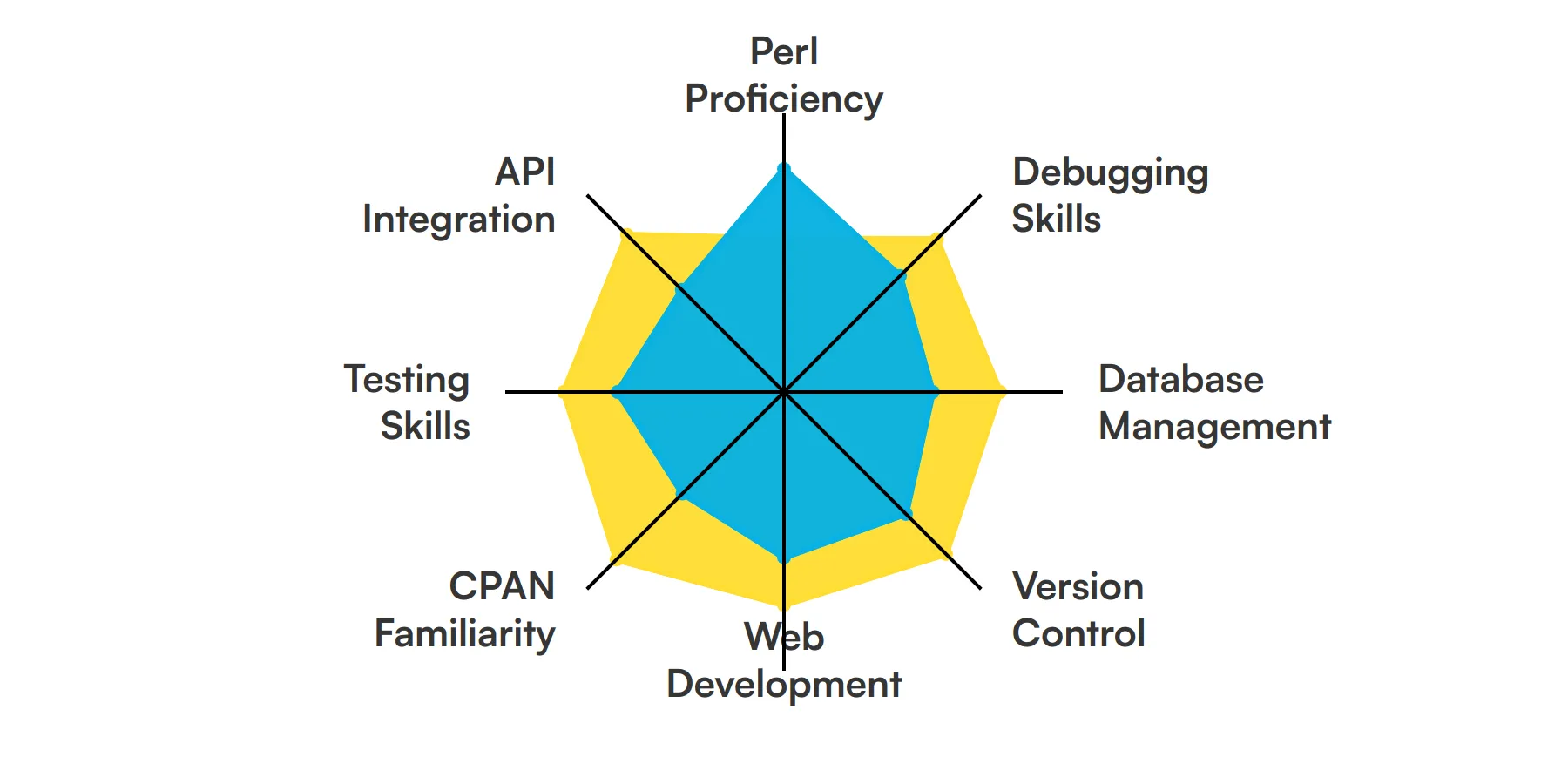
Perl Proficiency
A Perl developer must have a deep understanding of Perl, including syntax, regular expressions, and data structures. This knowledge is crucial for writing efficient scripts that perform well and are easy to maintain. The role often involves integrating Perl scripts with other technologies, making a strong command of the language necessary.
For more insights, check out our guide to writing a Perl Developer Job Description.
Debugging Skills
Identifying and fixing bugs in Perl scripts is a daily task for Perl developers. They need to be adept at using debugging tools and techniques to ensure the software runs smoothly and meets all operational requirements. This skill also involves optimizing existing code to prevent future issues.
Database Management
Perl developers frequently interact with databases, requiring skills in SQL and database design. Whether it's retrieving data for applications or managing database interactions, understanding database management systems like MySQL or PostgreSQL is important for backend integration and data manipulation tasks.
Version Control
Experience with version control systems such as Git is necessary for managing changes to the project codebase. This skill helps Perl developers collaborate with others, track modifications, and revert to previous versions if necessary, ensuring the continuity and stability of projects.
Check out our guide for a comprehensive list of interview questions.
Web Development
Knowledge of web development technologies including HTML, CSS, and JavaScript complements Perl expertise, especially when working on web applications. Perl developers use these skills to create dynamic web pages and improve user interactions with the backend systems scripted in Perl.
CPAN Familiarity
The Comprehensive Perl Archive Network (CPAN) is a vast repository of Perl software and modules. A Perl developer should know how to navigate and utilize CPAN to find modules that can be used to extend the functionality of their applications, saving time and enhancing performance.
Testing Skills
Writing tests for Perl applications is essential to ensure the reliability and functionality of the software. Perl developers use various testing frameworks to automate testing processes, helping to catch bugs early and streamline the development cycle.
For more insights, check out our guide to writing a Test Engineer Job Description.
API Integration
Integrating various external APIs with Perl scripts is a common requirement for Perl developers. This skill involves understanding API documentation, handling JSON or XML data formats, and ensuring secure and efficient communication between systems.
9 secondary Perl Developer skills and traits
The best skills for Perl Developers include Linux/Unix, Networking Basics, Security Practices, Performance Tuning, Project Management, Communication Skills, Problem Solving, Continuous Integration and Cloud Services.
Let’s dive into the details by examining the 9 secondary skills of a Perl Developer.
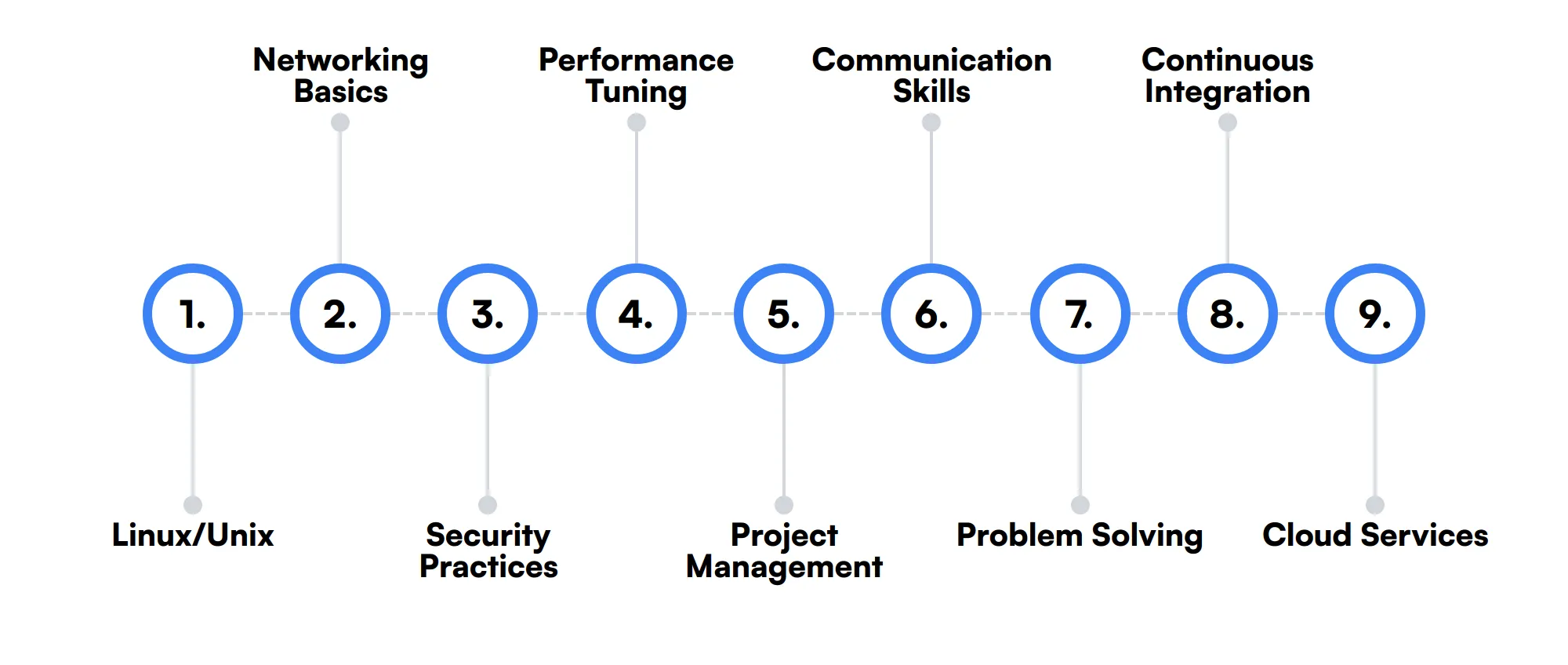
Linux/Unix
Perl developers often work in Linux or Unix environments, so familiarity with these operating systems and their command-line tools is beneficial.
Networking Basics
Understanding basic networking concepts can help Perl developers troubleshoot issues related to network programming and integration.
Security Practices
Knowledge of security best practices is important, especially when Perl scripts handle sensitive data or are exposed to the web.
Performance Tuning
Perl developers should be able to optimize scripts for better performance, which involves understanding both Perl-specific and general optimization techniques.
Project Management
While not directly coding related, understanding project management principles can help Perl developers manage their tasks more effectively within a team.
Communication Skills
Good communication is necessary for collaborating with team members and stakeholders, ensuring that project requirements and timelines are clearly understood and met.
Problem Solving
The ability to quickly identify problems and think through solutions is valuable in adapting to new challenges during development.
Continuous Integration
Experience with continuous integration tools helps in automating the testing and deployment of Perl applications, contributing to more efficient development cycles.
Cloud Services
Familiarity with cloud services like AWS or Azure can be advantageous, as many applications today leverage cloud infrastructure for scalability and performance.
How to assess Perl Developer skills and traits
Assessing the skills and traits of a Perl Developer can be a challenging task. It's not just about knowing the syntax; it's about understanding how to apply it effectively in real-world scenarios. From Perl proficiency to debugging skills, and from database management to web development, there are multiple facets to consider.
Traditional resumes might list qualifications, but they don't provide a clear picture of a candidate's practical abilities or how well they fit your specific needs. Skills-based assessments are a reliable way to gauge a candidate's competencies. For instance, Adaface on-the-job skill tests can help you achieve 2x improved quality of hires by focusing on real-world tasks and scenarios.
When assessing a Perl Developer, it's important to evaluate their familiarity with CPAN, their testing skills, and their ability to integrate APIs. These are just a few of the key skills that can make a significant difference in their performance. By using targeted assessments, you can ensure that you are hiring the right talent for your team.
Let’s look at how to assess Perl Developer skills with these 6 talent assessments.
Perl Online Test
Our Perl Online Test evaluates candidates on their proficiency in the Perl programming language, covering a wide range of skills from basic syntax to complex web development and database connectivity.
The test assesses their understanding of Perl syntax, data types, control structures, regular expressions, file handling, modules, packages, object-oriented programming, and error handling. It includes both multiple-choice questions and a coding challenge to gauge hands-on programming skills.
Successful candidates demonstrate a thorough understanding of Perl's capabilities in automating tasks, developing web applications, and managing databases effectively.
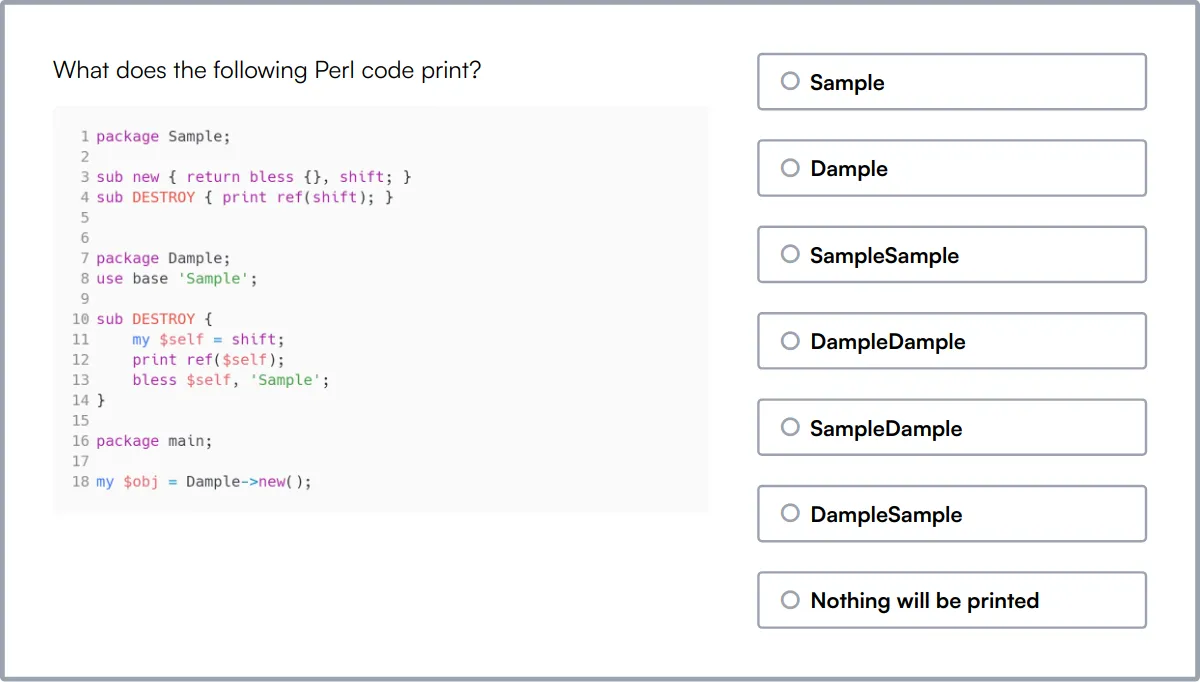
Problem Solving Test
Our Problem Solving Test measures a candidate's ability to analyze and solve complex problems using various reasoning skills.
This test evaluates abstract reasoning, critical thinking, deductive reasoning, inductive reasoning, pattern matching, and spatial reasoning through a series of scenario-based questions.
Candidates who perform well on this test are adept at understanding complex scenarios and crafting strategic solutions efficiently.
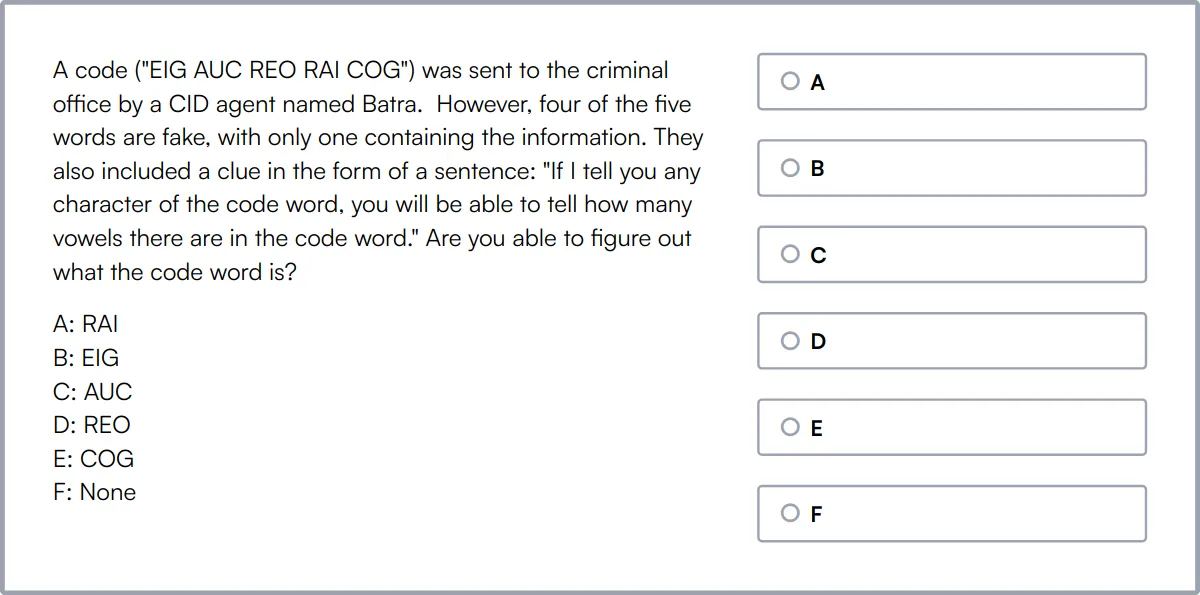
MySQL Online Test
The MySQL Online Test is designed to assess candidates' expertise in MySQL, focusing on SQL queries, database design, and advanced features like indexing and transactions.
Candidates are tested on their knowledge of SQL queries, normalization, indexing, joins, data manipulation, definition languages, views, stored procedures, and triggers.
High-scoring individuals are proficient in designing efficient, scalable databases and executing complex SQL operations.

Git Online Test
Our Git Online Test evaluates a candidate's understanding of Git, from basic commands to advanced repository management and branching strategies.
The test covers repository creation, branching, merging, committing changes, conflict resolution, remote repositories, rebasing, and various Git workflows.
Candidates who excel in this test are capable of managing source code effectively, ensuring smooth and efficient version control in collaborative environments.
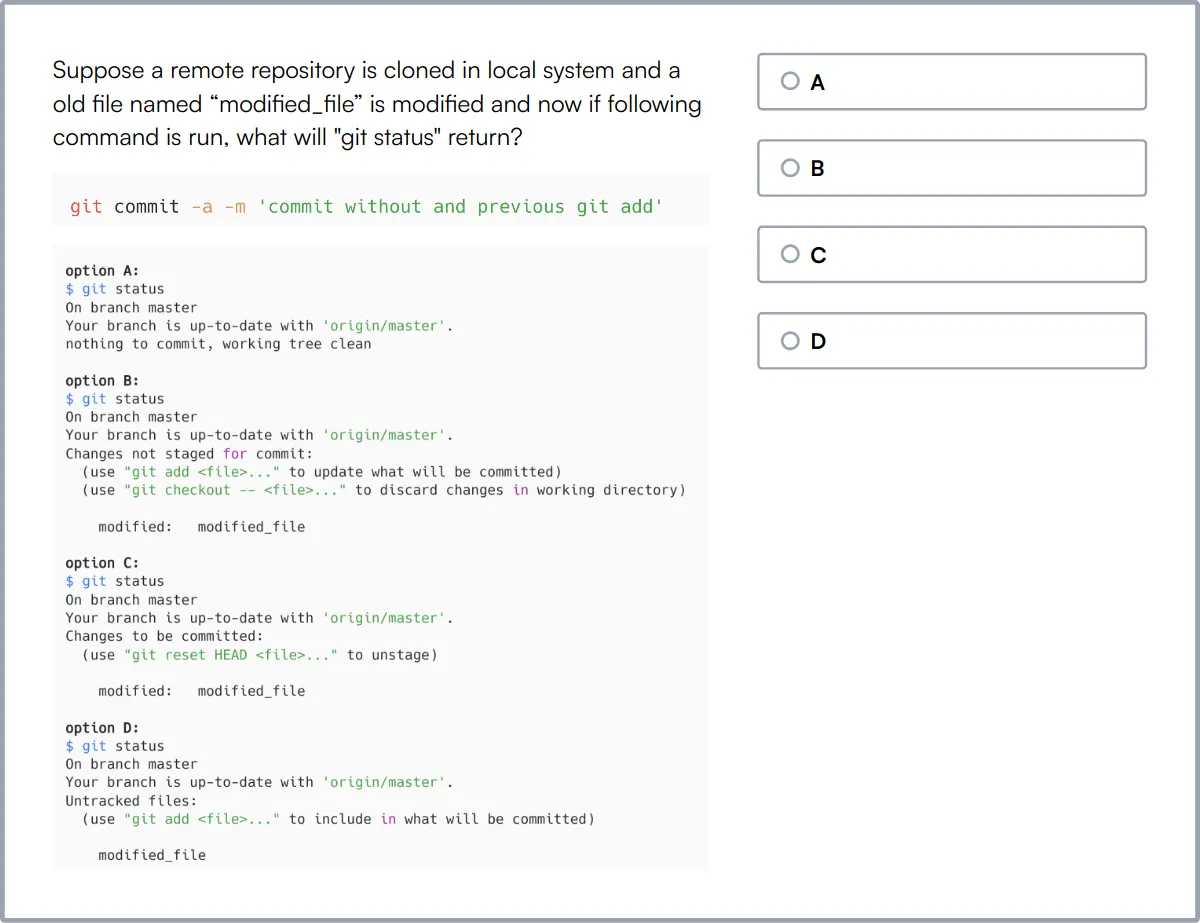
JavaScript & HTML/CSS Online Test
The JavaScript & HTML/CSS Online Test assesses candidates on their technical skills in JavaScript and HTML/CSS, crucial for modern web development.
This test evaluates JavaScript basics, ES6, OOPs, handling APIs, asynchronous programming, and CSS styling techniques including Flexbox and Grid layouts.
Proficient candidates demonstrate strong capabilities in building interactive and responsive web applications using both JavaScript and HTML/CSS.
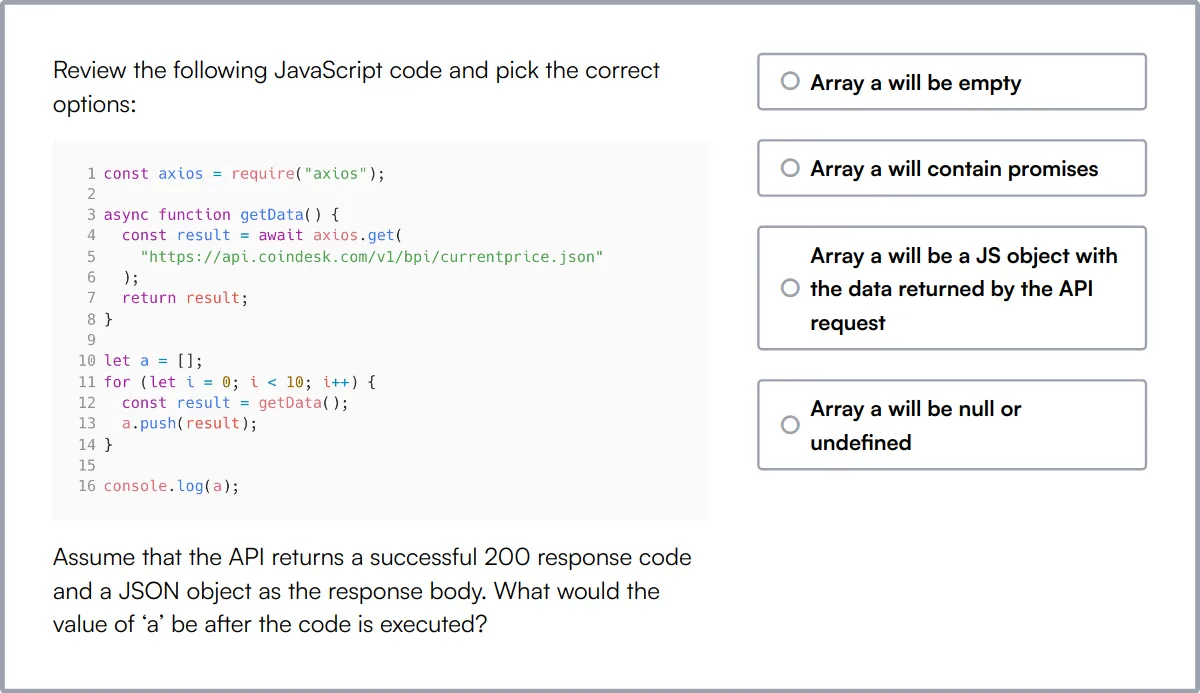
QA Engineer Test
Our QA Engineer Test assesses a candidate's knowledge in quality assurance, focusing on testing fundamentals, test design techniques, and automation with Selenium.
The test challenges candidates with questions on software life cycles, QA programming, program testing, Selenium fundamentals, and Linux basics.
Well-performing candidates show a strong ability to design comprehensive test plans and automate tests, ensuring software quality and efficiency.
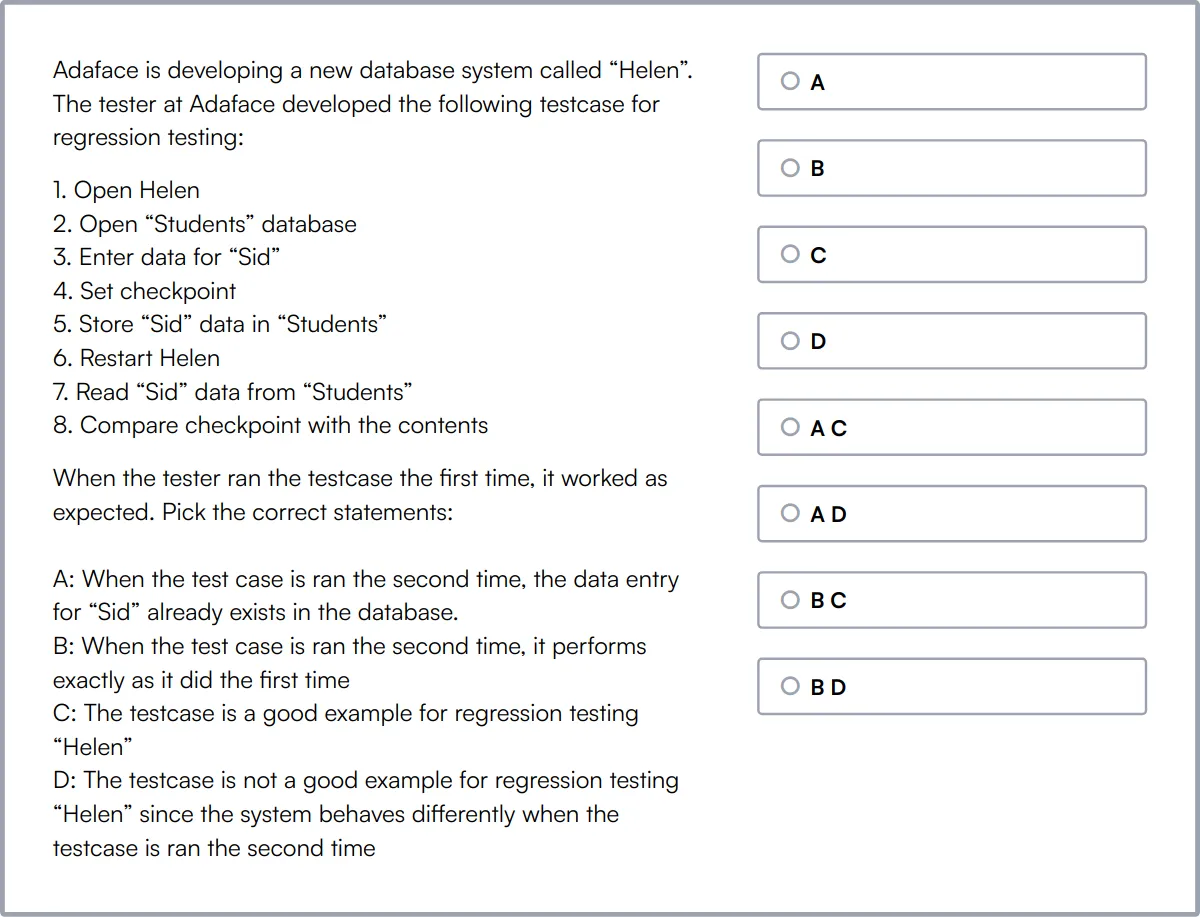
Summary: The 8 key Perl Developer skills and how to test for them
| Perl Developer skill | How to assess them |
|---|---|
| 1. Perl Proficiency | Evaluate the ability to write and understand complex Perl scripts. |
| 2. Debugging Skills | Assess the capability to identify and fix code issues. |
| 3. Database Management | Check proficiency in handling and querying databases. |
| 4. Version Control | Gauge experience with tools like Git for code management. |
| 5. Web Development | Determine skills in building and maintaining web applications. |
| 6. CPAN Familiarity | Evaluate knowledge of using and contributing to CPAN modules. |
| 7. Testing Skills | Assess the ability to write and execute test cases. |
| 8. API Integration | Check experience in integrating and using various APIs. |
Perl Online Test
Perl Developer skills FAQs
What are the key Perl proficiency skills required for a Perl Developer?
A Perl Developer should be skilled in writing, understanding, and maintaining Perl scripts, using complex data structures, and applying regular expressions. Familiarity with Perl's testing frameworks and modules from CPAN is also important.
How can debugging skills be assessed in Perl Developer candidates?
Assess debugging skills by providing candidates with broken or inefficient Perl code and asking them to identify and fix the issues. Observing their approach to using debuggers like perl -d or CPAN modules can also provide insights.
What is the importance of database management in Perl development?
Database management is key for Perl Developers as many applications require interaction with databases. Skills in SQL, and using Perl DBI (Database Interface) for connecting applications to databases, are necessary.
Why is version control important for Perl Developers?
Version control systems like Git help Perl Developers manage changes to their codebase, collaborate with others, and maintain a history of their work. This is essential for tracking changes and effective collaboration.
How do Perl Developers use CPAN for effective programming?
CPAN, the Comprehensive Perl Archive Network, provides a vast library of Perl modules which developers can use to extend the functionality of their scripts without reinventing the wheel, saving time and enhancing reliability.
What are some effective ways to test Perl applications?
Effective testing of Perl applications can be done using Perl’s built-in testing libraries like Test::Simple, Test::More, and Test::Deep. These tools help in writing unit tests, integration tests, and ensuring code reliability.
How important are communication skills for a Perl Developer?
Communication skills are important for Perl Developers to explain complex technical details to non-technical stakeholders, collaborate with team members, and document their code clearly and comprehensively.
What role does API integration play in Perl development?
API integration allows Perl Developers to enhance functionality by connecting and interacting with other software applications and systems. Proficiency in using web APIs with Perl is necessary for modern web development.

40 min skill tests.
No trick questions.
Accurate shortlisting.
We make it easy for you to find the best candidates in your pipeline with a 40 min skills test.
Try for freeRelated posts



